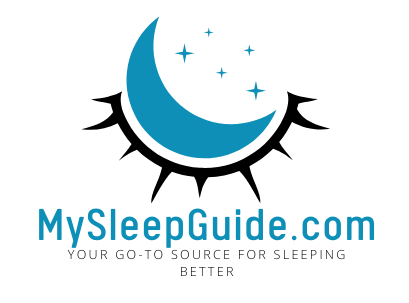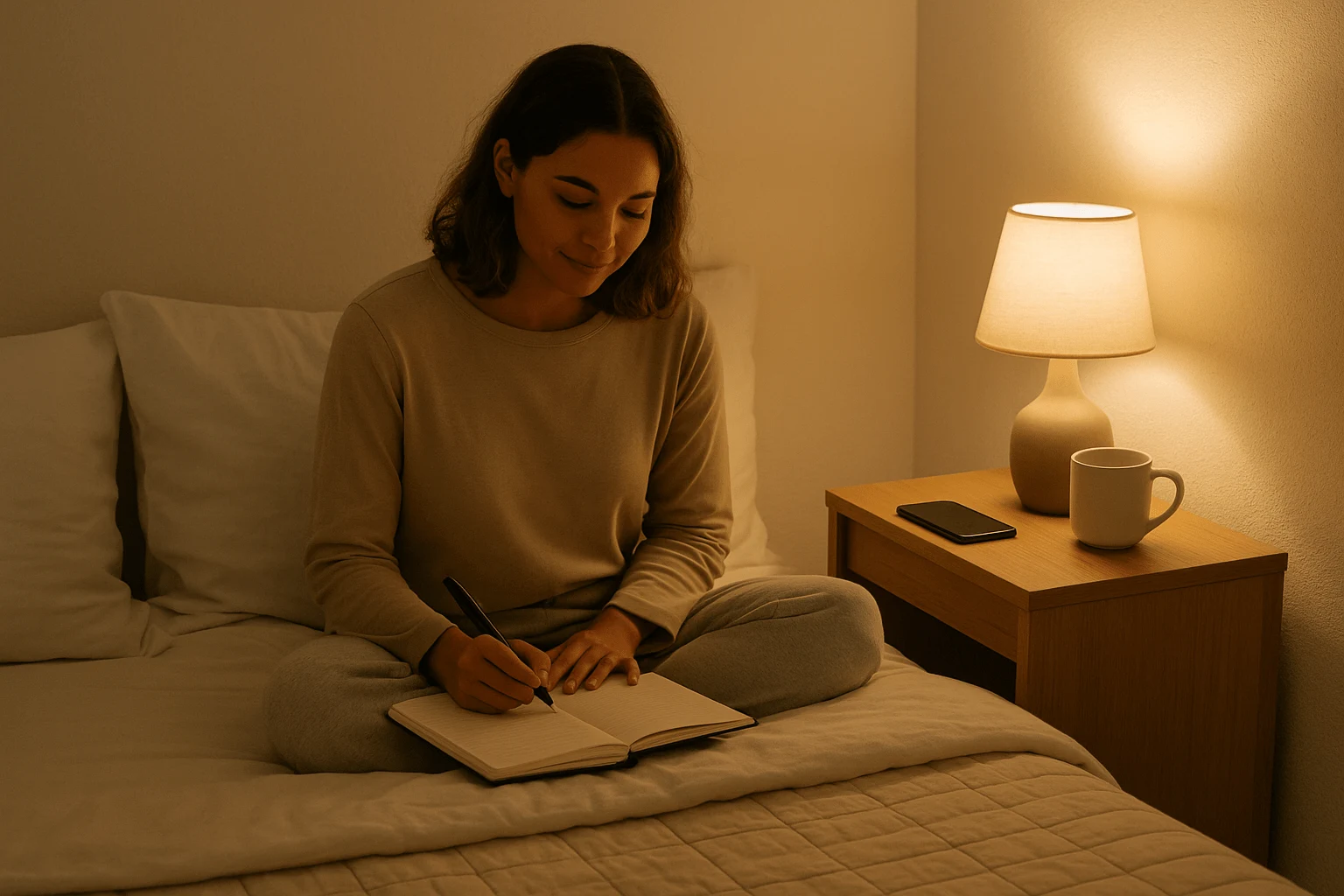Ever lie down at night only to have your mind start racing? The to-do lists, worries, and random thoughts make it nearly impossible to drift off. That’s where journaling for sleep comes in.
Spending just a few minutes writing before bed can quiet the mental chatter, ease anxiety, and help your body shift into rest mode. It’s simple, free, and doesn’t require anything more than a notebook and pen.
In this guide, you’ll learn why journaling improves sleep, the best ways to do it, prompts to get started, and what really happens when you stick with it for 30 days.
Why Journaling for Sleep Works

When your mind is busy, falling asleep feels like trying to rest with the lights still on. That’s the challenge many people face—your body might be tired, but your brain hasn’t had a chance to shut down. Journaling for sleep works because it gives those thoughts a place to go.
By writing before bed, you’re:
- Clearing mental clutter. Instead of carrying tomorrow’s tasks into bed, you get them out on paper so your brain doesn’t keep replaying them.
- Easing nighttime anxiety. Journaling helps you release stress from the day, which lowers the tension that often keeps people awake.
- Creating a wind-down ritual. Just like brushing your teeth signals bedtime for your body, writing signals bedtime for your mind.
- Building consistency. Over time, your brain learns that journaling is the cue to switch into rest mode.
What makes journaling different from simply thinking things through is the act of writing. Putting words on paper feels final—it tells your mind, this is handled, I can let it go.
That’s why so many people find they fall asleep faster, wake up less often, and even feel calmer in the mornings.
5 Types of Journaling to Try Before Bed
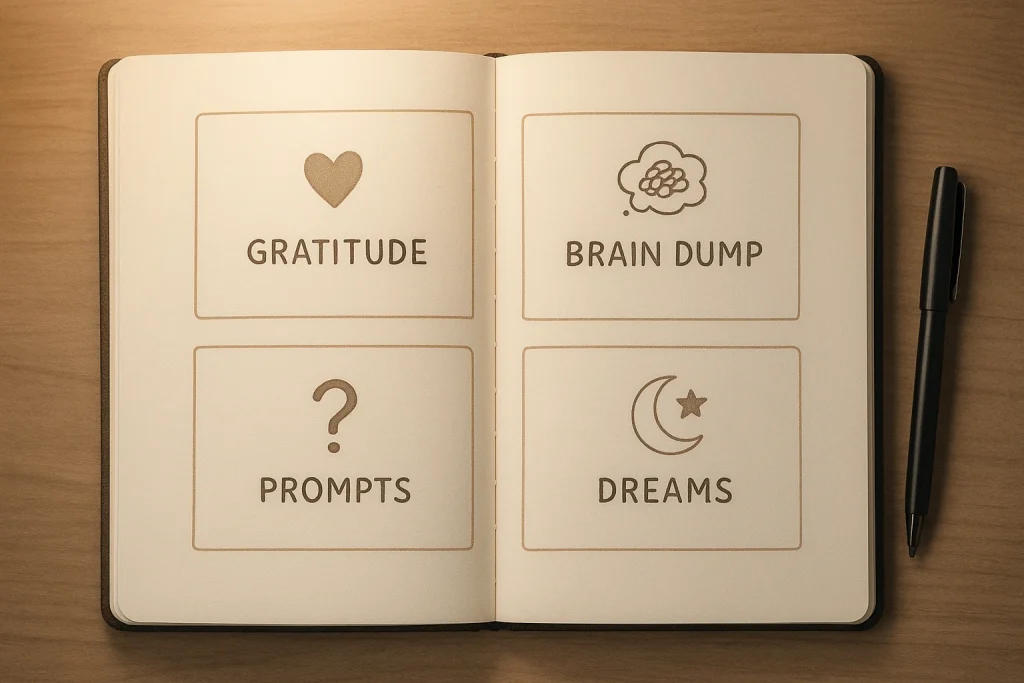
Not all journaling looks the same. The best approach depends on what keeps you up at night—stress, overthinking, or just an unsettled mind. Here are a few styles you can experiment with:
Gratitude Journaling
Take a few minutes to jot down three things you’re thankful for. Shifting your focus from what’s missing to what’s working can calm anxious thoughts and help your mind settle before sleep.
Worry Dump Journaling
If racing thoughts are your main struggle, try a “brain dump.” Write down everything on your mind—tasks, worries, random thoughts—and let the notebook hold them for you. This kind of bedtime journaling is especially useful if you wake up at 2 a.m. thinking about tomorrow’s to-do list.
A 2018 study found that people who wrote down upcoming tasks before bed fell asleep significantly faster compared to those who reflected on past events. It gives your mind permission to let go.
Free Writing
Set a timer for five to ten minutes and write whatever comes to mind without editing. This style clears mental clutter and helps you release tension without worrying about structure or grammar.
Guided Prompts
Some nights, staring at a blank page feels overwhelming. That’s where guided prompts come in. Using a simple question like “What do I need to let go of today?” can make journaling feel easier and more structured.
Dream Journaling
If vivid dreams or restless nights leave you unsettled, try jotting down your dreams as soon as you wake up. Over time, this can reduce subconscious stress and help you feel more in control of your sleep patterns.
Journal Prompts for Sleep and Anxiety
Sometimes the hardest part of journaling is knowing what to write. Having a few prompts can make it easier to get started, especially when your mind feels busy. Try picking one or two of these each night and see which ones help you unwind:
- What’s one thought I want to let go of before bed?
- Three things I’m grateful for today.
- What’s one small win I had today?
- One thing I’ll take care of tomorrow so I don’t have to think about it tonight.
- What’s something that made me smile today?
- If my mind feels heavy, what’s weighing me down right now?
- How does my body feel in this moment?
- What’s one thing I can forgive myself for today?
- A calming memory or place I want to picture as I fall asleep.
- What’s one word I want to carry into tomorrow?
These prompts don’t need long answers. Even a few lines can help shift your focus and calm your mind before bed.
Related Posts:
- Why Am I Always Tired? 7 Causes of Daytime Fatigue
- Should You Shower Before Bed for Better Sleep?
- How to Use Meditation for Sleep: Step-by-Step Guide
Best Practices for Bedtime Journaling
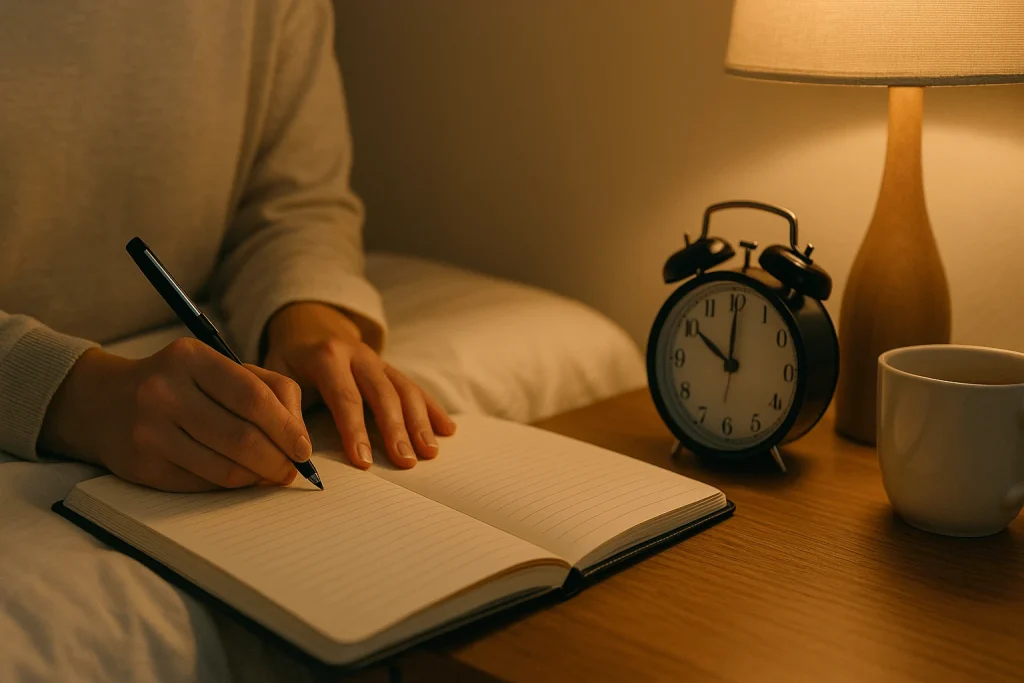
If you’ve never journaled before bed, you might wonder: How do I actually start? The good news is, there’s no “perfect” way. But a few simple habits can make bedtime journaling more effective and easier to stick with.
Choose the Right Time
Aim to journal about 30–60 minutes before bed. Writing too close to lights-out can sometimes wake your brain back up, while journaling earlier gives your thoughts time to settle.
Keep It Short
You don’t need to fill pages. Even 5–15 minutes of writing is enough to clear your head and calm your mind. Consistency matters more than word count.
Paper vs. Digital
Both work, but many people find pen and paper more effective since screens can keep the brain alert. If you prefer digital, choose a distraction-free notes app and lower the brightness.
Create a Calming Environment
Think of journaling as part of your nighttime routine. Dim the lights, sit somewhere comfortable, and maybe pair it with a cup of herbal tea or a few deep breaths. Over time, your brain will associate this ritual with winding down for sleep.
Pair It with Other Sleep Habits
Bedtime journaling works best alongside good sleep hygiene. Try combining it with a tech-free hour, gentle stretches, or relaxing music to strengthen your body’s sleep signals.
Pitfalls to Avoid When Journaling at Night
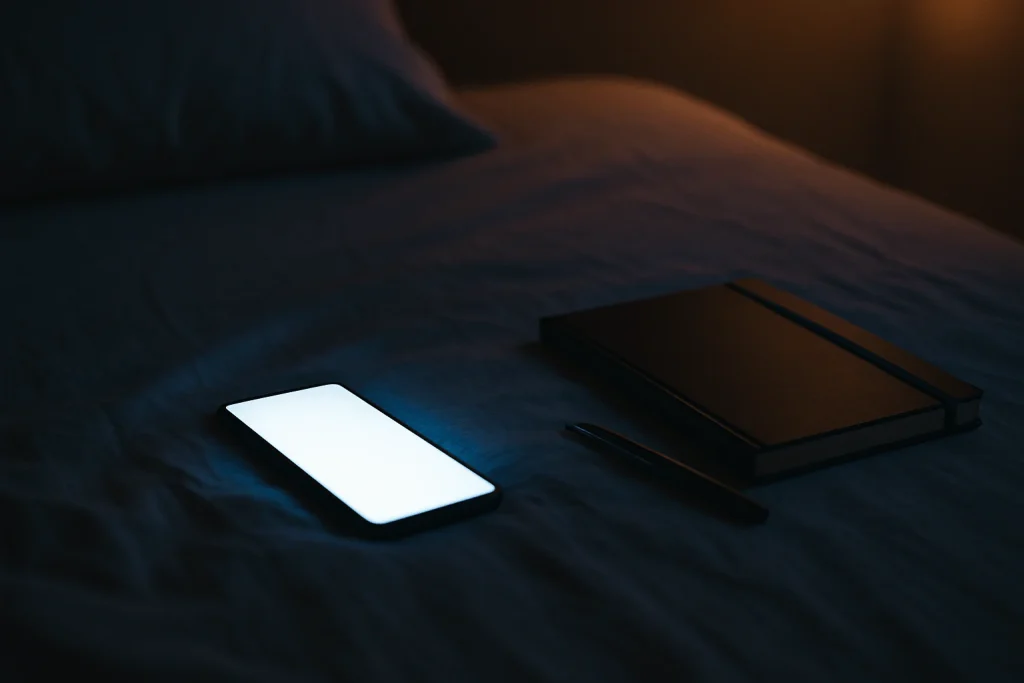
Like any new habit, journaling can backfire if it’s not done with the right mindset. Here are a few common mistakes people run into—and how to avoid them:
Writing Too Close to Bedtime
If you start journaling the moment your head hits the pillow, it might wake your brain back up. Try finishing your writing at least 20–30 minutes before lights out so your thoughts have time to settle.
Dwelling on Problems Instead of Releasing Them
The point of nighttime journaling is to unload worries, not magnify them. If you find yourself spiraling, switch to prompts like “Three things I’m grateful for today” or “One thing I’m letting go of tonight.”
Feeling Pressured to “Do It Right”
There’s no perfect way to journal. It doesn’t need to be neat, poetic, or even make sense. The goal is simple: get the racing thoughts out of your head and onto paper so your mind can rest.
Writing Too Much
Some people end up pouring out pages and pages, which can actually overstimulate the mind. Keep it short—5 to 15 minutes is enough for most.
What I Noticed After 30 Days of Journaling for Sleep

When I first gave journaling for sleep a try, I wasn’t expecting a miracle. I just wanted to stop lying awake dreading bedtime. But after sticking with it for a month, I noticed some real changes—not just in how I slept, but in how I felt during the day too.
Here’s what stood out after 30 days of journaling before bed:
1. Falling Asleep Came Sooner
Before, I’d lie awake for almost an hour most nights, replaying my to-do list. Once I started journaling, I usually fell asleep within 10–15 minutes.
2. The 2 a.m. Wake-Ups Happened Less
I used to wake up in the middle of the night, mind racing, and grab my phone. After a month of journaling, those wake-ups were rare—and when they did happen, they didn’t spiral.
3. My Sleep Felt Deeper
I didn’t just fall asleep faster—I stayed asleep longer. Fewer dreams, less tossing around, and I woke up feeling more rested.
4. Mornings Felt Easier
I used to wake up already stressed, like I was behind before the day even started. With journaling, I woke up clearer and more focused.
5. Anxiety Didn’t Disappear—But It Got Quieter
Journaling didn’t erase my anxiety, but it made it easier to handle. I had a way to face my thoughts instead of letting them spin.
If you’ve been struggling with sleep, try this. You don’t need a special journal or app—just a notebook and a few minutes before bed. It might make your nights lighter and your mornings calmer.
Download This Free Printable Sleep Tracker
Final Takeaway
Journaling for sleep doesn’t need to be complicated. A few minutes each night with a notebook can make the difference between lying awake with racing thoughts and finally letting your mind rest.
Start small. Try one of the prompts, or just jot down whatever’s on your mind before bed. Over time, those few quiet minutes can become one of the most calming parts of your routine—and a simple way to invite deeper, easier sleep.
FAQs About Journaling for Sleep
How long should I journal before bed?
Most people find that 5–15 minutes is enough. A short brain dump, a gratitude list, or a few journal prompts can help you unwind without overstimulating your mind.
What’s the best time to journal for sleep?
The ideal time is 30–60 minutes before bed—after finishing evening tasks but before getting fully settled in. Pairing journaling with your wind-down routine makes it more effective.
Do I have to journal every night for it to work?
No. While being consistent helps, you don’t need to journal every single night. Even writing a few evenings a week can calm racing thoughts and make it easier to fall asleep.
Can journaling help with insomnia long-term?
Yes, for many people it does. Journaling reduces bedtime anxiety and helps you fall asleep faster. While it’s not a cure for chronic insomnia, it can be a powerful tool alongside good sleep hygiene and other calming habits.
What if journaling makes me overthink more?
This can happen at first. Keep your writing simple and structured—use a specific prompt, set a timer for 5–10 minutes, and focus on getting thoughts out of your head, not solving them all. It usually gets easier and more calming with practice.
Can journaling replace meditation or sleep supplements?
No. Think of journaling as part of a sleep toolkit. It pairs well with calming practices like meditation, stretching, or drinking herbal tea. If you use supplements such as magnesium or melatonin, journaling complements them by easing the mental side of sleep anxiety.
Do I need a special journal for sleep?
Not at all. Any notebook will work. Some people like guided sleep journals with prompts, but a plain notebook and pen are enough to build the habit.
{ “@context”: “https://schema.org”, “@type”: “FAQPage”, “mainEntity”: [ { “@type”: “Question”, “name”: “How long should I journal before bed?”, “acceptedAnswer”: { “@type”: “Answer”, “text”: “5–15 minutes is enough. A quick brain dump, a gratitude list, or a few prompts will help you unwind without overstimulating your mind.” } }, { “@type”: “Question”, “name”: “What’s the best time to journal for sleep?”, “acceptedAnswer”: { “@type”: “Answer”, “text”: “30–60 minutes before bed. Finish evening tasks first, then write as part of your wind-down routine.” } }, { “@type”: “Question”, “name”: “Do I have to journal every night for it to work?”, “acceptedAnswer”: { “@type”: “Answer”, “text”: “No. A few nights a week can still calm racing thoughts and make it easier to fall asleep. Consistency helps, perfection isn’t required.” } }, { “@type”: “Question”, “name”: “Can journaling help with insomnia long-term?”, “acceptedAnswer”: { “@type”: “Answer”, “text”: “For many people, yes. It reduces bedtime anxiety and can shorten the time to fall asleep. It’s not a cure, but it works well alongside good sleep habits.” } }, { “@type”: “Question”, “name”: “What if journaling makes me overthink more?”, “acceptedAnswer”: { “@type”: “Answer”, “text”: “Keep it short and structured. Pick one prompt, set a 5–10 minute timer, and focus on getting thoughts out, not solving everything.” } }, { “@type”: “Question”, “name”: “Can journaling replace meditation or sleep supplements?”, “acceptedAnswer”: { “@type”: “Answer”, “text”: “No. Think of journaling as part of a toolkit. It pairs well with meditation, gentle stretching, or herbal tea, and can complement magnesium or melatonin if you use them.” } }, { “@type”: “Question”, “name”: “Do I need a special journal for sleep?”, “acceptedAnswer”: { “@type”: “Answer”, “text”: “No. Any notebook works. Guided journals can help, but a plain notebook and pen are enough to build the habit.” } } ] }